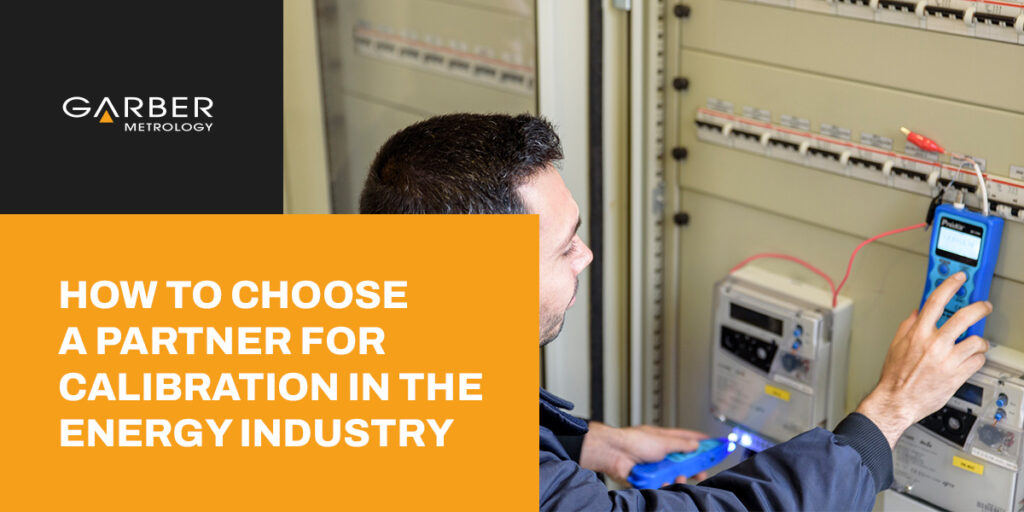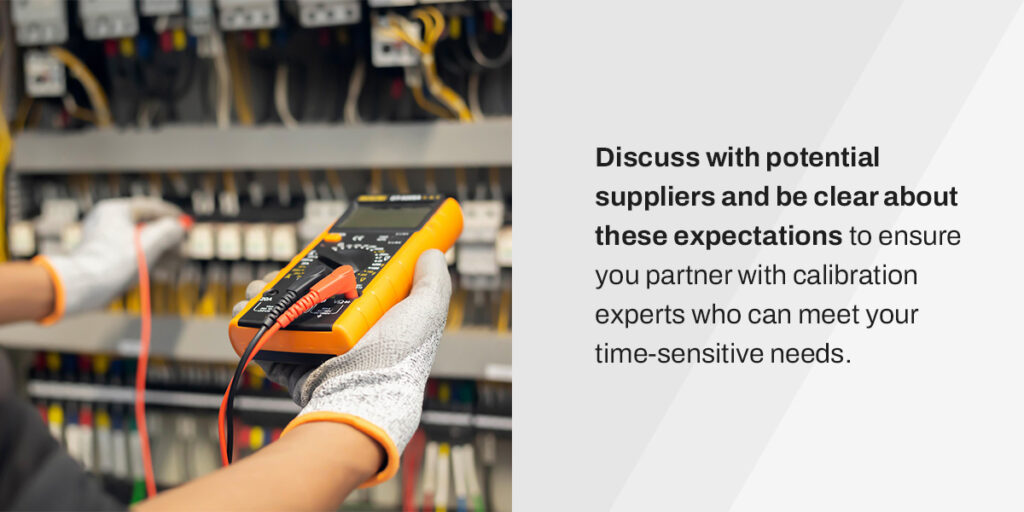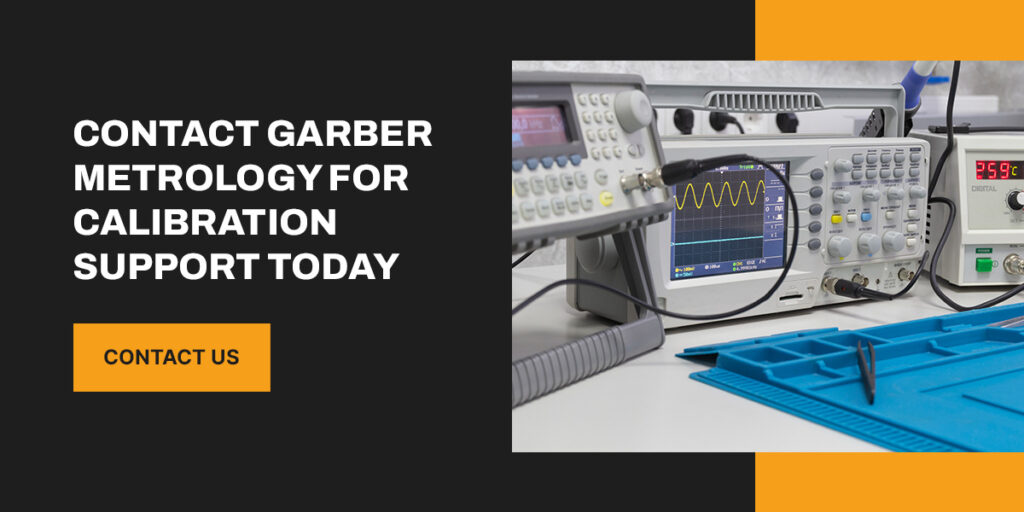
Calibration is critical in the energy industry to ensure equipment maintains optimal functionality. As market demands change, regular and experienced calibration is becoming more critical, and the global calibration services market size is expected to reach $7948.83 million by 2027. More organizations in the energy industry are partnering with accredited calibration service providers to ensure the longevity and reliability of equipment.
Choosing the right calibration partner is vital, as you need peace of mind that regular calibrations strike the right balance between cost-effectiveness and reliability. A successful calibration partnership can help you improve productivity, maintain safety and ensure compliance with industry regulations.
Learn About Our LabMaintaining the highest possible safety standards is vital in the energy industry. In addition, ensuring regulatory compliance and optimizing efficiency is crucial to ensure streamlined operations. Energy calibration is a significant consideration for energy industry professionals to achieve optimum equipment performance, save energy and improve plant efficiency.
Regular equipment calibrating extends instrument life, increases safety, cuts costs, and simplifies certification. Some of the many areas in which regular testing and calibration are essential include the following:
Instrument calibration is one of many maintenance processes in your plant. To operate effectively, calibration must be necessary and practical. Having a reliable calibration partner helps ensure you can achieve the most accurate results while generating a return on investment (ROI).
Accurate testing and calibration are essential for safety, compliance and optimal processes, so choosing the right calibration partner for your business is necessary. Some of the primary considerations when selecting a calibration partner include the following:
Energy equipment performance and measurements must be accurate to elevate your overall performance. High-fidelity calibration equipment delivers more precise results, increasing the effectiveness and longevity of your equipment. Your calibration partner will measure your equipment against a specific standard during testing. If your equipment reads outside the standard, the technician discovers the source of the problem and recalibrates your equipment until the reading is accurate.
A quality calibration partner will provide you with certificates for the services they perform so that you can verify their testing. They should document all their work and have accurate labeling practices. Having paperwork in hand increases transparency in your partnership and you can remain confident that your instruments are performing optimally.
Instrumentation calibration requires skilled experts with experience to ensure you can rely on your equipment’s performance. Consider a calibration partner with several years of experience in the field and the energy industry. Experienced calibration technicians are more effective in troubleshooting equipment issues and can verify that your equipment is in good working condition and performing well.

Consider the maximum amount of time you can afford to have your equipment out of the process for calibration. Your calibration partner should be able to match your delivery expectations with the supplier. Discuss with potential suppliers and be clear about these expectations to ensure you partner with calibration experts who can meet your time-sensitive needs.
Some calibration partners focus on a particular area of expertise, while others have an extensive range of capabilities in your field. Ask your potential partners what they do when equipment outside their standard expertise comes in for calibration. Your ideal partner has the knowledge and capabilities to work with multiple types of equipment so that they can handle all of your calibration needs.
Accreditations speak to the quality of work you can expect from a calibration partner. Any partner you choose should have accreditation from third-party standardization organizations. The most critical accreditations to look for include the following:
ISO/IEC 17025:2017: This International Organization for Standardization (ISO) accreditation is for laboratory competence, consistency and impartiality. It’s a testament to compliance, efficiency and performance.
ISO 9001:2015: This is a standard for implementing a quality management system (QMS). Although less specific to calibration laboratories, it requires companies to document their procedures and undergo regular audits.
ANSI/NCSL Z540-1: This standard from the American National Standards Institute (ANSI) and the National Conference of Standards Laboratories (NCSL) tests a calibration laboratory’s equipment to ensure it operates correctly.
These accreditations show that an independent body has assessed your calibration partner’s techniques, procedures, equipment and competence for specific capabilities. You can rest assured that your partner can perform the appropriate testing and calibrations.
Every business in the energy industry has unique needs and calibration schedules. Find out if your potential calibration partner can work with your schedule and provide a flexible service to suit your needs. You may need a provider to plan on-site calibrations around your predetermined shutdowns.
Customer service is an important consideration when choosing a calibration partner. Depending on how frequently you use equipment, they may require regular calibration. A solid relationship with a trusted partner is essential to streamline calibration.
Ask your potential calibration partner if they provide emergency calibration services and consider whether they offer different calibration methods to work around environmental interference such as temperature and humidity. In addition, find out how your potential provider plans to update you on the status of your equipment. Communication methods should be transparent, and it should be easy to contact the right person if an issue arises.
Choosing the right calibration partner requires careful consideration. You must be confident they can meet your needs and provide quality and reliability. Garber Metrology is a fully accredited calibration laboratory with the following capabilities:
We pride ourselves on keeping your equipment compliant and functioning optimally with minimal downtime. We can pick up locally, receive shipments or schedule on-site visits to work within your schedule, and with over four decades of calibration experience in several industries, you can rest assured that you’ll benefit from exceptional service.

At Garber Metrology, we understand how important it is to balance accurate calibration with minimal downtime. We can help you with ISO-accredited calibration and a variety of calibration methods, including on-site and laboratory calibration.
We aim to return your equipment to you within five working days and provide each of our partners with exceptional customer service. We provide a full, industry-compliant calibration service with fast turnaround times to ensure minimal downtime for our valued customers. Contact us to learn more about our calibration support today.
Contact Us Today